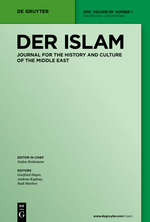Der Islam - Concept
Der Islam
Journal of the History and Culture of the Middle East
founded by Carl Heinrich Becker

About one hundred years ago, Carl Heinrich Becker authored his programmatic editorial for the newly founded Journal Der Islam - "Der Islam als Problem." This inaugural text was an important step toward the creation of modern Islamwissenschaft, signalling a new way of studying Islam and its civilization.
Becker understood "Islam" as a term denoting the history, culture, and civilization of the societies of the Islamic Empire and all its successor states until the present. Islam, he argued, in one way or another had put its imprint on the cultures, ethnics, and different religious belief systems of the societies it had come to rule. It was to be seen as the equivalent of the terms "Hellenistic" or "Roman" in the study of antiquity. This secular understanding of Islamwissenschaft had deep roots in nineteenth-century Western scholarship of the Middle East in its Enlightenment-inspired dissociation from the near-exclusive focus on Middle Eastern languages and texts as practised by Christian theologians.
In some ways, the events of 9/11 and their aftermath have caused the meaning of "Islam" to shift back to a much narrower definition, at least in the public discourse, involving the religion and theology and, even more so, its political expression. Yet in its new incarnation, starting with the 2012 issue Der Islam maintains its name as conceived by its founder. It also represents continuity by wanting to be a forum for discussion about the history, culture, sociology and civilisation of the societies dominated, influenced and inflected by Islamic empires, from the seventh century to advent of the "modern" world in the nineteenth century. Its geography range runs from Iberian Peninsula to the Indian subcontinent, from the Ukrainian steppes to the highlands of Yemen. In keeping with its multi- and interdisciplinary tradition, Der Islam seeks to transcend disciplines and to bring together contributions which blend fields such as history, art history, archaeology, philology, cultural studies, art, papyrology, archival studies, and numismatics, so as to pave the way for a renewed understanding of Islam-inflected societies. We welcome question-driven studies that combine various methodologies and that have implications for one or more fields of study.
With a new editorial board, consisting of Stefan Heidemann (Universität Hamburg, editor in chief), Gottfried Hagen (University of Michigan), Andreas Kaplony (Ludwig-Maximilians-Universität, Munich), Rudi Matthee (University of Delaware), Kristina L. Richardson (City University of New York), and Amke Dietert (editorial manager and review editor) a multidisciplinary approach to history and culture of the Middle East is assured.
Guidelines for Contributors
Der Islam is a semiannual journal published by De Gruyter, Berlin. It is devoted to the study of the history and culture of the Middle East to the advent of the 'modern' world using a wide range of sources and methods to explore its political, economic, social, cultural developments. All article submissions are subject to a peer assessment by international authorities. The editors welcome contributions in English, but also in German and French. A fast publication can be assured.
The journal is published in print and online (hosted by De Gruyter). The print content of the journal includes the following:
- Scholarly articles of up to 8,000 words including footnotes; each article should be accompanied by an abstract of up to 150 words. Please submit your contribution according to our style sheet. [Download style sheet]
- Review articles of up to 8,000 words (Reviewer's guide).
- Book, catalogue, and exhibition reviews of up to 2,500 words.
Longer texts will also be considered, although the longer format must be justified and longer pieces may experience more delay in being considered and published in the journal.
See the latest issue of Der Islam.
Studies in the History and Culture of the Middle East
Studies in the History and Culture of the Middle East are published as supplement to Der Islam. Following Becker's lead, the mission of the series is the study of past societies of the Middle East, their belief systems, and their underlying social and economic relations, from the Iberian Peninsula to Central Asia, and from the Ukrainian steppes to the highlands of Yemen. Publications in the series draw on the philological groundwork generated by the literary tradition, but in their aim to cover the entire spectrum of the historically oriented humanities and social sciences, also utilize textual sources as well as archival, material, and archaeological evidence.
Direct submission inquiries to:
Der Islam
Universität Hamburg, Asien-Afrika-Institut
Edmund-Siemers-Allee 1, Ost
D-20146 Hamburg, Germany
E-Mail: der_islam.aai@uni-hamburg.de
Tel.: +49 40 42838-5925 or -3181
Editorial Board
Stefan Heidemann, Editor in Chief, Universität Hamburg
E-Mail: stefan.heidemann@uni-hamburg.de
Gottfried Hagen, University of Michigan, Ann Arbor
E-Mail: ghagen@umich.edu
Andreas Kaplony, Ludwig-Maximilians-Universität München
E-Mail: andreas.kaplony@lmu.de
Rudi Matthee, University of Delaware, Newark
E-Mail: matthee@udel.edu
Kristina L. Richardson, City University of New York
E-Mail: kristina.richardson@qc.cuny.edu
Amke Dietert, Review Editor and Editorial Manager, Universität Hamburg
E-Mail: der_islam.aai@uni-hamburg.de
Advisory Board
Prof. Frédéric Bauden, Université de Liège
Prof. Thomas Bauer, Universität Münster
Prof. Michael Cook, Princeton University
Prof. Suraiya Faroqhi, İstanbul Bilgi University
Prof. Maribel Fierro, Consejo Superior de Investigaciones Científicas
Prof. Nelly Hanna, The American University in Cairo
PD Dr. Benjamin Jokisch, Universität Hamburg
Prof. Benjamin Kedar, The Hebrew University of Jerusalem
Prof. Geoffrey Khan, Cambridge University
Prof. Alastair Northedge, Université Paris 1 Panthéon-Sorbonne
Prof. Jürgen Paul, Martin-Luther-Universität Halle-Wittenberg
Prof. Christian Robin, Centre national de la recherche scientifique
Prof. Mansour Sefatgol, University of Tehran
Prof. Florian Schwarz, Österreichische Akademie der Wissenschaften
Prof. Maya Shatzmiller, University of Western Ontario
